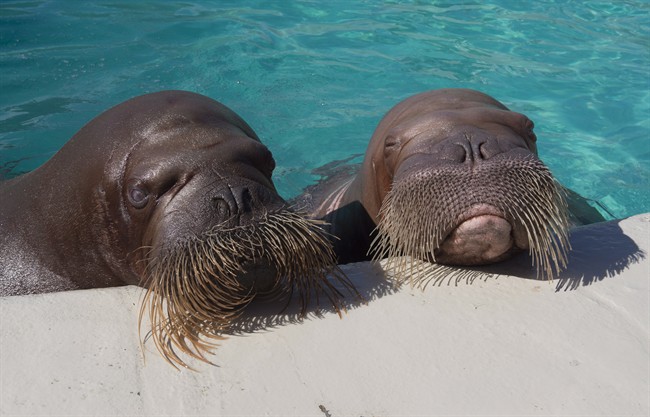Two pregnant walruses sparking excitement at Quebec City aquarium
Advertisement
Read this article for free:
or
Already have an account? Log in here »
To continue reading, please subscribe:
Monthly Digital Subscription
$0 for the first 4 weeks*
- Enjoy unlimited reading on winnipegfreepress.com
- Read the E-Edition, our digital replica newspaper
- Access News Break, our award-winning app
- Play interactive puzzles
*No charge for 4 weeks then price increases to the regular rate of $19.00 plus GST every four weeks. Offer available to new and qualified returning subscribers only. Cancel any time.
Monthly Digital Subscription
$4.75/week*
- Enjoy unlimited reading on winnipegfreepress.com
- Read the E-Edition, our digital replica newspaper
- Access News Break, our award-winning app
- Play interactive puzzles
*Billed as $19 plus GST every four weeks. Cancel any time.
To continue reading, please subscribe:
Add Free Press access to your Brandon Sun subscription for only an additional
$1 for the first 4 weeks*
*Your next subscription payment will increase by $1.00 and you will be charged $16.99 plus GST for four weeks. After four weeks, your payment will increase to $23.99 plus GST every four weeks.
Read unlimited articles for free today:
or
Already have an account? Log in here »
Hey there, time traveller!
This article was published 16/03/2016 (3536 days ago), so information in it may no longer be current.
Quebec City’s aquarium might soon be blessed with not just one, but two very large bundles of joy in a somewhat unexpected and exceedingly rare occurrence.
The Aquarium du Quebec’s two female walruses, Arnaliaq and Samka, are both pregnant and due to give birth in a few months.
As sometimes is the case with this sort of thing, the good news was a pleasant surprise, says curator Jill Marvin.

“There are some people who can try for 10 years and never get pregnant and others who blink and they’re pregnant,” Marvin said in an interview. “Well, I think we blinked … and we got two females pregnant and, to my knowledge, no one else has ever had that.”
Since 1930, only 19 female walruses have become pregnant in captivity in North America, according to the scant data available. Marvin says 15 resulted in live births, with just six surviving beyond one year. And only one of those reached adulthood.
Aquarium staff had long hoped the two females would get pregnant as they and their male counterpart, Boris, reached sexual maturity.
“One of the problems is the male and the female don’t cycle at the same time,” Marvin said.
But as the aquarium soon found out, the trio’s cycles were very much in tune.
“The fact we have two females pregnant at this young age by our own male, I think there are a lot of proud adopted mothers, grandmothers,” Marvin said.
Boris and Samka are both 10, while Arnaliaq is 12. Walruses in the wild can live up to 40 years.
The first signs in the 15-to-16-month gestation period came in the fall: irregular weight gain, increased appetite and a bigger belly.
Then in January, an ultrasound on Samka revealed a heartbeat and not long after came one for Arnie, as she is nicknamed.
Arnaliaq and Samka are tentatively due at the end of April and early June respectively.
The aquarium plans to keep people up to speed on the pregnancies through its Facebook page.
Marvin says walrus pregnancies are not unlike human ones: veterinarians will watch for signs of miscarriage, as well as ensuring the babies are positioned properly and gaining enough weight. Once born, there will be questions about milk production and weight gain.
The odds might not be in their favour, Marvin concedes, but she has faith in the staff and the animals, who are both healthy.
The walrus enclosure is fitted with cameras. Marvin keeps tabs using her iPad and staff monitor them constantly while consulting with global experts and looking at research data from people who follow walruses in the wild.
“That’s what we’re doing right now: trying to prepare for every single situation that has been observed and might be possible so we’ll be able to handle as best as possible anything that can happen,” Marvin said.
There are only about 30 walruses currently housed in zoological institutions around the world.
The last time a walrus is believed to have been born under human care was at Germany’s Hagenbeck Zoo in 2014.
– Follow @sidhartha_b on Twitter.

